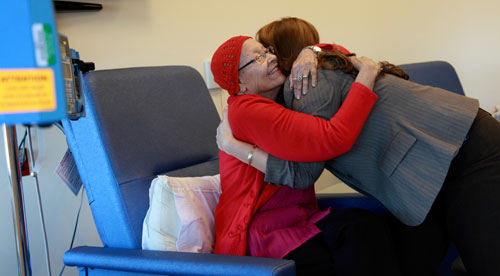Love and patience come through in any language


Teresa Alvarez is a pioneer Promotora, a promoter of health education and a founding member of the volunteers trained at Christiana Care to reach out to other women in the Latina community to advocate for cancer screenings.
It is a cause close to her heart. Her daughter, Sharon Gomez, was a Community Health Outreach and Education coordinator at Christiana Care, and recruited her mom to help with the Promotoras initiative.
“One of the things we talk about to the Latinas is the importance of doing a monthly self breast exam,” says Alvarez, a native of Puerto Rico who lives in Wilmington.
She followed that advice herself, doing self exams in addition to getting an annual mammogram.
Last September, she discovered a lump on her clavicle. The diagnosis: lymphoma, a type of cancer that begins in immune system cells called lymphocytes.
Alvarez was frightened. Her mother died from breast cancer. She also lost a brother to lung cancer.
But she knew from her Promotoras training that a cancer diagnosis is not a death sentence. She began treatment immediately at the Helen F. Graham Cancer Center at Christiana Care.
On a recent afternoon, Alvarez, 71, arrived for her sixth and final round of chemotherapy. Gomez, now a Spanish interpreter in the Emergency Department, interpreted for her mother as she talked about her work with the Promotoras.
“My mother tells the women that if they take care of themselves they will have a better quality of life and will see their children grow,” Gomez says.
“The Promotoras have played an important role in Christiana Care’s mission of bringing screenings and education to underserved communities,” says Nora Katurakes, manager, Community Health Outreach and Education.
“With the training we give them, they go back to their communities and raise awareness about the importance of cancer screenings and preventive care,” she says.
Among Hispanic women, breast cancer is the leading cause of cancer death, according to the American Cancer Society. Hispanic women are 20 percent more likely to die from breast cancer than non-Hispanic white women diagnosed at the same age, often because the cancer is diagnosed at a later stage, according to ACS Cancer Facts.
“I was able to get through to the women with love and with patience—and by sitting them down a couple of times and persisting,” Alvarez says. “I tell them that if you are able to detect cancer early there is a very good chance you can cure it.”
At Helen F. Graham, she receives highly skilled and compassionate care. Her care is seamlessly coordinated by a nurse navigator, who schedules treatments, tests and doctor’s appointments.
“I have wonderful doctors and nurses, very well trained, as well as kind and sympathetic,” she says. “Everything I need is right here.”